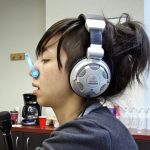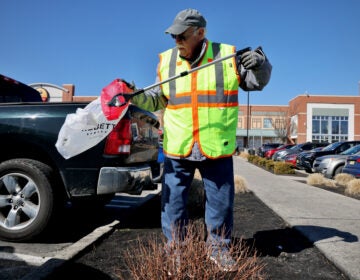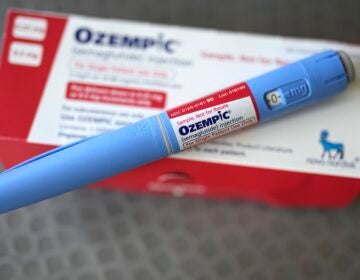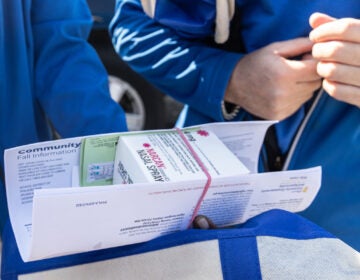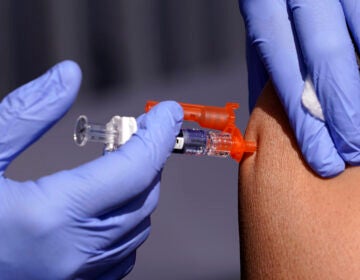Study: Low pay a driving factor in N.J.’s primary care shortage
The report found that New Jersey has around 17 primary care physicians for every 100,000 people, which is far below previous estimates.
Listen 1:12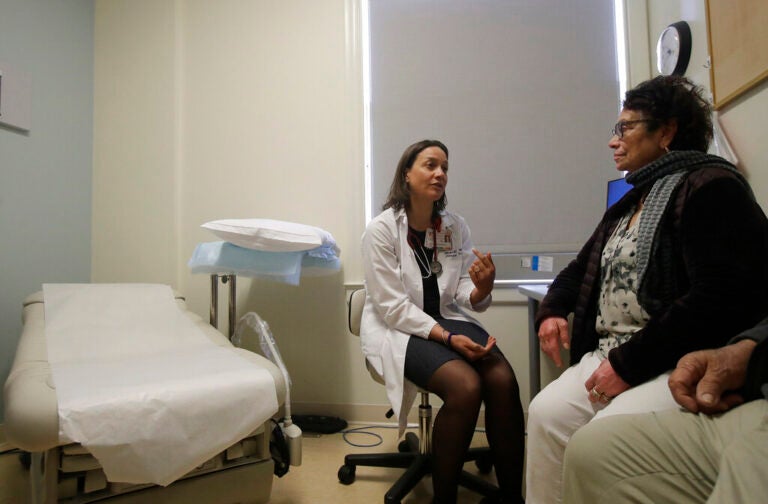
A new report found that New Jersey is facing a growing primary care physician shortage. In this April 9, 2019 photo, Dr. Megan Mahoney, left, talks with patient Consuelo Castaneda at the Stanford Family Medicine office in Stanford, Calif. (AP Photo/Jeff Chiu)
From Camden and Cherry Hill to Trenton and the Jersey Shore, what about life in New Jersey do you want WHYY News to cover? Let us know.
Low reimbursement rates are a major cause of New Jersey’s continuing primary care shortage, according to a study published by the New Jersey Health Care Quality Institute — and that shortage is hurting people’s health.
“New Jersey has a primary care crisis,” said study co-author Alfred Tallia, who chairs the Department of Family Medicine and Community Health at Rutgers Robert Wood Johnson Medical School. “Low pay is driving primary care doctors from New Jersey, and that in turn endangers state residents.”
The report found that New Jersey has around 17 primary care physicians for every 100,000 people, which is far below previous estimates.
This isn’t a problem unique to New Jersey — the U.S. as a whole faces a shortage of primary care physicians, who make up only about a third of the physician workforce, far lower than the more than 50% that’s common in other high-income countries. This matters, Tallia says, because primary care doctors play an essential role in preventative care, nipping small ailments in the bud before they balloon into bigger, more dangerous and more costly conditions.
“Primary care has been proven to reduce deaths, complications from diseases and health care disparities among populations, while at the same time reducing health care costs,” he said. “So if we lose primary care physicians from this state, it’s a real problem for the citizens of the state, because that means ultimately it’s going to adversely affect the health of our population.”
Although New Jersey ranks 10th in the country when it comes to primary care residents and fellows, it’s 32nd in retaining newly trained physicians. And a lot of that, Tallia says, comes down to pay.
“What we found is that Medicaid in New Jersey pays half of what Medicare pays in terms of reimbursement to primary care,” he said. “We also found that, unlike in other states, where commercial insurers pay maybe about 115-120%, maybe 130%, of what Medicare pays, here in New Jersey, the number [an average of 93%] is actually below Medicare. So it confirmed that we have a real issue with reimbursement.”
New Jersey ranks 48th out of the 50 states when it comes to spending on primary care, which Tallia called “horrific and not sustainable.”
To find out the impact of the shortage on patients, the working group behind the report — which included stakeholders including physician experts, insurers and consumers — compared data on mortality with the ratio of primary care physicians to the overall population. They found that New Jersey isn’t only short on primary care providers, but that half of the state’s estimated 5,300 providers are only working part time.
“Many of them were burnt out by the pandemic, which placed unusual and extraordinary demands on primary care services,” Tallia said, adding that poor work conditions have compounded the problem presented by reimbursements that are far lower than in other states, and than the reimbursements offered to specialist physicians.
In some cases, he said, the costs of operating a primary care practice have become unsustainable.
“Although the reward system may be poor in New Jersey, the costs of maintaining a practice are astronomical in New Jersey,” Tallia said. “So unless something is done, this is going to get worse, and I’m afraid the populations are going to be even more adversely affected by the shortage than they are right now.”
The report presents several recommendations for combating the shortage. First, raising Medicaid reimbursement rates to at least the level of Medicare, which Tallia calls “the floor of paying clinicians for the work that they do.”
Second, the report advises that the state take an active role in shifting doctor compensation away from a fee-for-service model, which focuses on paying for individual billable services as opposed to more holistic, but harder-to-bill, forms of care. Instead, the report recommends an advanced primary care model, which relies on interdisciplinary teams of care providers who focus on preventative care, the management of chronic conditions, and close tracking of patients’ health over time. The payment structure offers greater stability to primary care practices in part by providing fixed monthly payments from insurers.
“This is something that we’ve been working on at Rutgers for a long period of time,” Tallia said. “It means creating teams so that the physician is not the only person that has to be handling all the problems, but they’re assisted by nurses, by physician assistants, by pharmacists, social workers, a whole host of folks who can create a team. The way you get there is by changing the reimbursement system so that you’re not just paid like on a hamster wheel for doing more, but you’re paid [based] on the number of people that you take care of and how sick they are.”
The report also recommends establishing a uniform set of patient health metrics, as opposed to the diverse standards mandated by different insurers, and improving the collection of data related to caregiver numbers and medical expenditures, in order to better track the performance of primary care across the state.

Get daily updates from WHYY News!
WHYY is your source for fact-based, in-depth journalism and information. As a nonprofit organization, we rely on financial support from readers like you. Please give today.


